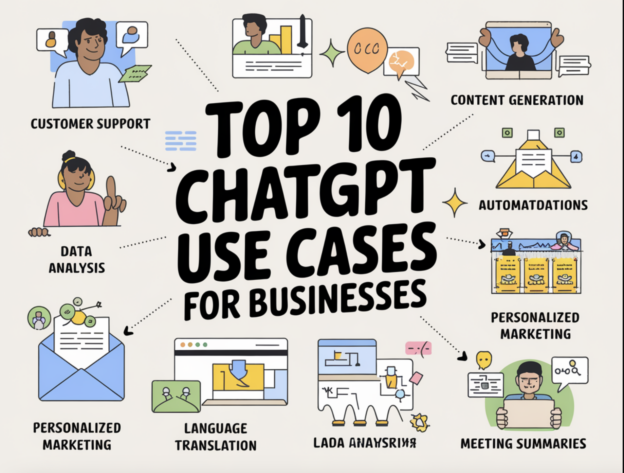ChatGPT is a versatile tool with immense potential for businesses across diverse industries. Its capability to comprehend and generate human-like text enables its use in numerous applications, making it valuable for companies aiming to optimize operations, boost customer engagement, and foster innovation. Let’s look at the top 10 ChatGPT use cases for businesses, showcasing how it can be effectively leveraged to meet various needs.
Customer Support and Virtual Assistants
One of the most prominent applications of ChatGPT is in customer support. Businesses can deploy ChatGPT-based chatbots as virtual assistants to handle routine inquiries, resolve customer issues, and provide information on products and services. These virtual assistants can operate 24/7, ensuring that customers receive instant support, improving response times and overall satisfaction. Using ChatGPT in this domain helps reduce the burden on human support agents, enabling them to focus on more complex queries.
Content Creation and Copywriting
ChatGPT’s advanced natural language capabilities make it an ideal tool for content creation. Whether generating blog posts, social media content, or marketing copy, businesses can use ChatGPT to create high-quality written material. By providing initial prompts or outlines, companies can receive draft content that aligns with their tone and messaging, significantly reducing the time and effort required to produce engaging content. This use case benefits marketing teams looking to scale content production without sacrificing quality.
Market Research and Trend Analysis
Market research can be time-consuming, but ChatGPT simplifies it by quickly summarizing industry trends, analyzing competitor information, and generating insights from unstructured data. By feeding the model with relevant data, businesses can obtain concise reports on market dynamics, helping them make informed decisions. ChatGPT can also sift through customer reviews, social media comments, and other sources to identify emerging trends and sentiment shifts, offering valuable insights for strategy development.
Training and Onboarding
Organizations often face challenges in training and onboarding new employees. ChatGPT can be an intelligent assistant, providing information on company policies, procedures, and role-specific details. New hires can interact with ChatGPT to get answers to common questions, reducing the reliance on human trainers and allowing for a more consistent and scalable onboarding experience. Moreover, ChatGPT can create customized training content, quizzes, and interactive learning modules to enhance the learning experience.
Personalized Customer Engagement
Personalized engagement is key to retaining customers and fostering loyalty. ChatGPT can analyze customer data to create customized messages, product recommendations, and targeted marketing campaigns. By integrating ChatGPT with CRM systems, businesses can generate individualized responses that cater to specific customer preferences and behaviors, making interactions more relevant and engaging. This level of personalization helps companies to stand out in competitive markets.
Document Automation and Summarization
Many business functions, such as legal and compliance, involve managing large volumes of documents. ChatGPT can assist by automating document generation, proofreading, and summarization. Businesses can use it to create standardized contracts, agreements, and reports based on predefined templates, ensuring consistency and accuracy. Additionally, ChatGPT can extract key points and summarize lengthy documents, saving time and aiding quick decision-making.
Social Media Management
Managing social media effectively requires consistent content updates and prompt responses to user interactions. ChatGPT can help businesses create engaging posts, respond to customer comments, and manage direct messages. Its ability to understand context and tone enables it to craft appropriate replies and maintain brand voice. This automation capability helps businesses keep an active social media presence without investing extensive resources.
Product Development and Innovation
ChatGPT can also brainstorm new product ideas and generate innovative solutions. By inputting customer feedback, market trends, and product performance data, businesses can use ChatGPT to generate creative ideas and suggestions for product improvement. It can assist product development teams in exploring new features, functionalities, and design elements, making it a valuable tool for driving innovation.
Sales Support and Lead Qualification
For sales teams, ChatGPT can act as a virtual assistant that helps qualify leads, answer product-related questions, and assist in scheduling meetings. By integrating with sales tools and CRM platforms, ChatGPT can automate the initial stages of lead qualification, reducing response times and allowing sales representatives to focus on closing deals. It can also generate tailored sales scripts based on customer profiles, enhancing the effectiveness of sales interactions.
Internal Collaboration and Knowledge Sharing
ChatGPT can facilitate internal collaboration by serving as a knowledge management tool. It can answer employee questions about internal processes, policies, and best practices. Also, ChatGPT can create, manage, and share knowledge articles, ensuring employees can access up-to-date information. This capability is especially useful for large organizations with distributed teams, as it promotes information consistency and improves knowledge accessibility.
Conclusion
ChatGPT offers businesses a versatile tool to enhance operations, streamline workflows, and improve engagement across various domains. By integrating ChatGPT into their processes, organizations can unlock new efficiencies and elevate their interactions with customers, partners, and employees. ChatGPT’s potential applications will only expand as AI technology evolves, making it a cornerstone of future business innovations.
https://www.marktechpost.com/2024/12/13/top-10-chatgpt-use-cases-for-businesses/?amp





